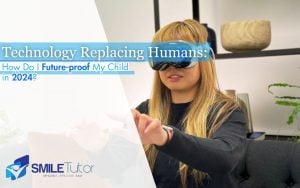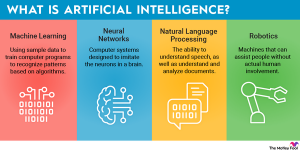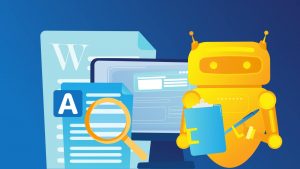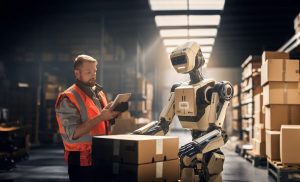
“Are you worried about the future?” I was asked this question one day.
“Worried? Why worried?”
“It’s not about us, it’s our children.”
At that reply, I paused in my reply.
Artificial technology (AI) became the topic, as we talked about the changing landscape of society and how jobs are gradually filled by machines.
And then at some point, these words were spoken: “AI will eventually take over our children’s jobs.”
Rather exaggerated, sure. But can we really deny those words?
Today, I wanted to share some of my collected thoughts about where AI is taking us.
Change is inevitable. But what can we do as parents, to future-proof our children?
The Basics of Artificial Intelligence

[The Motley Fool]
Did you know AI has made so much progress and headlines that Collins Dictionary has named “AI” the Word of the Year for 2023?
To understand the landscape our child will be exposed to, we must understand what AI is.
To begin, let’s have a quick summary on what AI is for the people at the back. AI, put simply, is making our machines “think and behave like humans”.
How AI Works
If, for example, a company wants to implement AI to make their work easier and more convenient, it needs three things:
One, the machine to handle it.
Two, the data used to train the AI.
And third, the code to ensure that the AI functions properly.
In order to make responses feel more humanlike, AI is continuously being improved in all three aspects day by day.
Controversies of AI

You should also understand that AI is not without its flaws.
Because AI uses big data (quite literally what it means!) to “learn”, plagiarism has become a point of concern.
Why? Well, if the “experience” the AI has is based off of the work of others, can you really
trust AI to be “original”?
However, plagiarism using real data is slowly being resolved, as the idea of synthetic data for AI was pulled back to the mainstream from the 1970s.
There were also concerns on the creative integrity of arts generated by AI. Artists were reasonably angry at the use of AI to ‘cheapen’ the time and process of making art, and there’s still an ongoing hate towards AI art as a whole on social media.
The Widespread Use of AI
Despite all of its flaws and grey areas, AI has already become widespread in use over a number of industries. It’s only a matter of time before the world becomes completely integrated with AI.
I’m sure you’ve heard of the Apple Vision Pro.

[ZDNET]
As one of the forefronts of consumer tech, Apple has announced their collaboration with OpenAI, allowing the user to have something better than Siri.
Yes, it’s a virtual assistant that can answer any questions that you throw at it, with replies so realistic you’ll forget that you’re not even talking to another human! The fact that this partnership exists only cements the fact that AI is only going to continue to grow.
Besides augmented reality, AI has also seen uses in aspects like digital assistance through chatbots, transportation with auto driving, banking with fraud detection, language translation, and education through personalised learning to name a few off a very long list.
Why Should We Prepare for Artificial Intelligence?
So… why should you as a parent care?
You’re still not convinced. You need examples. Is there evidence that AI is “taking over”, like many are saying?
Job Security

Here’s an unfortunate truth for you.
“Machines” are replacing more and more of our jobs.
AI’s already seen to be the next “industrial revolution”. In the near future, our children will live alongside AI, with all its conveniences and disadvantages. One of such disadvantages is that AI is continuously improving, killing jobs low on the “food chain”.
Why would Starbucks let real baristas keep their jobs when they can have the process fully automated from order to the completion of the drink?
What about working retail in one of Singapore’s clothing stores? Well, bad news there too. One of such companies, Levi Strauss & Co, has announced their investment into AI as it handles things like inventory tracking and personalised customer styling.
Keep in mind, AI has not developed to such a self-sufficient standard to completely replace ALL “low-difficulty” jobs. But remember, AI has years to perfect its technology, long enough to greet our children as they enter the working society.
How Can I Prepare My Child for AI?
It’s a good thing that you now understand how AI will affect your child’s job security.
So now, you want to future-proof your child. You want your child to be strong enough to handle the changing of times, so that they will not worry too much about their futures.
What can you, as parents, achieve this?
Prepare for AI, Not Against it

[Freepik]
Firstly, you must understand that you will achieve very little trying to fight against the development of AI. Instead of making decisions that will lead to career paths that completely distances themselves from the use of AI, you should actively push your child to become more exposed to AI.
No need to think complicated. Have your child interact with existing voice assistants like Siri or Alexa, for instance.
“Siri, what is five plus five?”
“Siri, what is the time now?”
Have your child be acquainted with the convenience and voice prompts that closely resemble how AI is used.
Another fun way to introduce AI to your child, is the use of face filters and effects on your phone cameras! Several apps like SnapChat and TikTok use AI to automatically position these filters on human faces. Explain how this “magic trick” is done, and spark your child’s interest to learn more about AI!
A Balance of Skill Building
As your child grows up and learns new things, two aspects (again) will determine what kind of jobs are suitable for them.

[Freepik]
One, technical skills. It defines your child’s specialisation. It’s that knowledge and expertise accumulated only from learning specific subjects or experiencing it themselves, in order to perform specific tasks and use specific tools and programs in real world situations.
Your boss hires you mainly because you have the technical skill to do the job. In every job, technical skill is required. But rely too much on technical skills, and your child will run the fear of being replaced. If your child has nothing more to offer as an individual outside of their technical skills, your next competitor will have a lower hurdle if they want to take over your job for the same amount of work but less pay!
In fact, AI is the best at replacing jobs with technical skills!

[Freepik]
Two, soft skills. Some may call it human skills. As the name suggests, experience in soft skills leans you more towards your “control over emotions” in a working environment. Soft skills are highly sought after in the industry, as it’s the one thing that AI cannot replace.
From person-to-person communication, customer service, leadership, management, teamwork and sales, soft skills challenge your child to have the emotional agility and empathy to adapt to real life problems. The boss doesn’t want to have to manage your child’s every decision. They want someone to take over and hold down the fort when things get busy!
But neglecting your technical skills also brings down your work efficiency, no matter how well you can handle relationships with your customers and co-workers!
As you can see, it’s not good when we lean too far to one side.
Find “Irreplaceable” Jobs

[Freepik]
With a good balance of both skill sets, find jobs that take both technical and soft skills into consideration, and understand how far its requirements and growth potential can take them.
A few good examples are teachers and tutors, doctors, artists, and lawyers.
Living Alongside a Future With AI

When AI fully takes over most of the simple work, our children will have to look for jobs that need human input and decisions made with human emotion. When that happens, soft skills will become very important.
Know what your child wants, and chart them a course that leads them to a path where they can co-exist without the competition of “AI workers”.
Start early, and teach your child to adapt early! This way, your child will be able to thrive with skills and know-how to have job retention, productive and overall work performance as a valuable asset!
But in the end, we are only human. The future of AI can be hard to predict. But ironically, the one thing that is for certain, is uncertainty.
Leaders are being tasked with managing a record level of change from politics to social issues due to the rapid pace of technological change. And those who embrace the human skills along with the technical skills will thrive.
